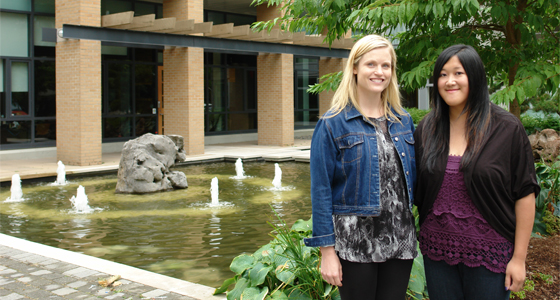 The development of academic and professional programming in the area of classroom climate is relatively new and unexplored. Aboriginal Initiatives programming at the Centre for Teaching, Learning and Technology (CTLT) responded by creating an innovative professional development series called Aboriginal Initiatives: Classroom Climate.
The development of academic and professional programming in the area of classroom climate is relatively new and unexplored. Aboriginal Initiatives programming at the Centre for Teaching, Learning and Technology (CTLT) responded by creating an innovative professional development series called Aboriginal Initiatives: Classroom Climate.
During the initial development of this series, Amy Perreault, Coordinator of Aboriginal Initiatives at CTLT, combined her research expertise with her direct experience creating projects such as What I Learned in Class Today: Aboriginal Issues in the Classroom.
The development of this series mirrored a process often taken on by faculty who teach about Aboriginal and other socially contentious issues in their classes. In some ways the inevitable challenges faculty face in this endeavor were present here too; creating an approach that would allow for a diverse group of people, all coming with different levels of understanding and experiences, to come together and create a community.
During this year-long series, faculty, teaching assistants, researchers, graduate students, and staff from all over the University have the opportunity to challenge their own assumptions about what they have learned about Aboriginal people, become more critically aware of their teaching and research practices, and learn more about how they engage with topics that challenge their own social location within the institution.
The breadth of participants’ experiences, locations, and roles within the University create a unique environment for the exchange of interdisciplinary approaches to teaching, and an opportunity to engage with and share experiences from a diverse range of perspectives.
This strategically-designed series creates a unique learning experience for participants by combining a series of mini-class lectures, interactive group activities, and one-on-one discussions with a strong focus on activities and discussions designed to evoke critical thinking and self awareness. As a result, participants gain skills to create a more clearly developed and informed approach to understanding and teaching about Aboriginal and other socially contentious issues in a curricular setting.
A great way to learn more about services at Aboriginal initiatives, and the Classroom Climate series in particular, is to attend the CTLT Aboriginal Programs Open House on September 26.
The first monthly session, Here: Valuing, Recognizing and Acknowledging Place, is on October 2. During this session presenters will discuss the importance of teaching faculty, students, and staff about local histories and the diversity of British Columbia.
One of the four presenters for this session will be Sarah Ling, the Aboriginal Initiatives Graduate Academic Assistant at CTLT. She will be sharing a project she co-developed on campus called Decolonizing Knowledge. This initiative facilitates strategies to reconcile the cultural misrepresentation and appropriation that occurs on the UBC Point Grey campus, and pioneered a community-based naming process between the Musqueam First Nation and UBC Student Housing and Hospitality Services. In her work with CTLT, Sarah will assist with the creation of resources committed to developing a learning climate at UBC that prepares students, faculty, staff, and administration to better understand the dynamics of discussing Aboriginal issues in a multicultural, course-based environment. The resources will value and acknowledge the traditional and unceded territory of the Musqueam people which our learning and activities at UBC take place on.
Impact on Faculty Presenters and Participants
The diversity of experiences, both of the participants and the series presenters, has been cited as being one of the key strengths of this program. Past participants and presenters also noted that they appreciated the honesty and integrity of the conversations in each session, where facilitators were “walking the walk” by demonstrating how they pedagogically built in how to have difficult conversations in their classes. Here’s what some of them had to say:
The nuanced nature of working with Aboriginal people and issues is often difficult to address in a substantive way. I was impressed with the preparation, level of participation and feedback from participants. It opened a space to further our work and it is a model for future discourse on these issues.
Rick Ouellet, Aboriginal Student and Community Development Officer (series presenter)
I believe that fostering productive conversations amongst faculty makes us better able to foster productive conversations in our classrooms with our students. It gives us important background knowledge, confidence in the language and terminology, practices to address sensitive topics, and pedagogical strategies. It gives us a sense, too, that we are not alone: other people in other classrooms are raising similar issues in different disciplinary contexts. One of the main things I have taken away from these sessions is the sense that yes, discussing Aboriginal issues in the classroom can be sensitive and highly charged, but if we do not give our students the space, time, and skills to discuss them there, then when will they have the opportunity? If not here, where?
Katherine Grafton (faculty participant)
While the focus of the series was the setting of the classroom, through discussions we discovered that the setting includes other spaces on campus. Libraries in particular became a space where the discussions turned as an example of what happens outside of the classroom. I think that it was an excellent opportunity for librarians to engage with faculty in a way that highlights the instruction on the reference desk, and how we face similar challenges with questions related to Aboriginal issues.
Sarah Dupont, Aboriginal Engagement Librarian, Xwi7xwa Library (staff participant)


Proud of UBC’s effort in this areas and wish for further collaboration with other institutions – particularly interested in pedagogy of teaching agriculture and resource legal issues of Aboriginals in law schools.
[…] In some ways the inevitable challenges faculty face in this endeavor were present here too; creating an approach that would allow for a diverse group of people, all coming with different levels of understanding and experiences, … […]
[…] https://ctlt.ubc.ca/2012/09/25/aboriginal-initiatives-classroom-climate-series/ […]